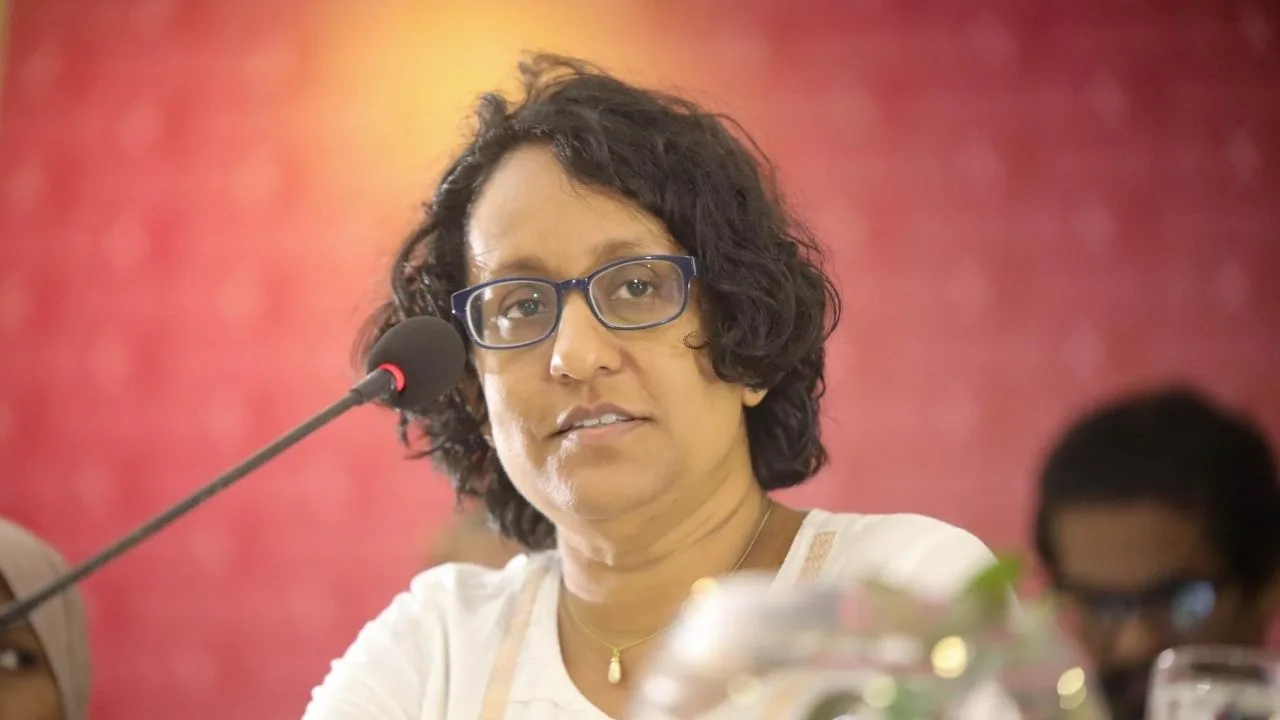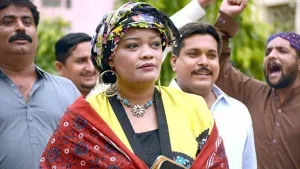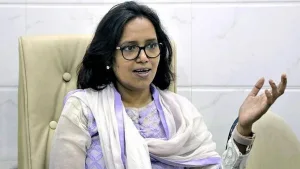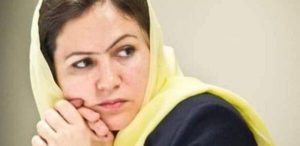“Women in Sri Lanka Need to Change The Masculine, Toxic Political Space”: Dr. Harini Amarasuriya

Sri Lanka is all set to elect its ninth Parliament on 5 August 2020. According to officials, 7,452 candidates, 70 parties and 313 independent groups are contesting the elections.
Sri Lanka has a unique place in history for electing the world’s first female Prime Minister- Sirimavo Bandaranayake. However, only 5.3% Members of Parliament in the last session were women. Women’s representation in the Parliament as well as grassroots institutions has been abysmally low, inspite of better gender indicators in the South Asia region.
Only 24 women have been fielded by the main political alliances in these elections.
Dr. Harini Amarasuriya is one of the 24 contesting women in the upcoming elections from the National People’s Power (NPP) alliance. She is an academic and a Senior Lecturer in the Open University of Sri Lanka.
In this interview with BehanBox and Women for Politics, Dr. Amarasuriya talks about the toxic, masculine and undemocratic political spaces and why more women are needed in Sri Lanka’s politics to shift the discourse.
Tell us about your background and growing up in Sri Lanka?
I come from a very middle-class family. My father was a tea planter and I grew up on the tea estate in the south of the country.
I have two older siblings and I was born many years after them. As I was growing up, things were beginning to change in Sri Lanka in the 70s and the tea estates had just been taken over by the government. So we moved to Colombo.
I went to an Anglican private girls school in Colombo, which is basically known for producing good colonial wives for the emerging native colonial man.
But as you know, women tend to also undermine these projects.
So the school that I went to, also produced some really strong, feminist women.
There was also that ethos of service, because it was run by nuns. And I think that also had an impact on my life
I went to the United States as an exchange student for one year when I was in school. It was around 1988-89, also, a very violent time in Sri Lanka. The war was raging in the north and insurrection in the south.
As a result, my school career got disrupted because schools were shut, universities were shut.
And then I ended up in India doing my undergraduation at Hindu college in University of Delhi. Those four years were fantastic.
After a Masters in applied anthropology in Australia, I returned to Sri Lanka and started working in the international humanitarian and development sector. I was deeply frustrated with the development sector after a while.
I took a break and did a PhD, which is a very luxurious way of taking a break. But it was a wonderful time. I got time to think, read and write. I joined the university system after my PhD.
What was growing up like amidst the conflict in Sri Lanka? Especially for women to have lived through a difficult period such as this?
I have particular memories of living through the conflict. Like, the ethnic riots in 1983. I belong to the majority community but I lived in an area with a lot of Tamil neighbours. I was 13 years old and I remember feeling really confused and scared.
You know something is really wrong because some of your neighbours have disappeared suddenly. School had changed drastically as a lot of our Tamil friends were no longer in school. A lot of our teachers had left. I remember my father used to step out to check the roads in the morning before we started school.
But, I had the privilege of being from a majority community and I lived in the south.
I also came from a family that was very politically conservative. I remember having arguments with my father about things that were going on and decisions that have been made by the government in responding to the insurrection in the south and the issues in the north and east.
It’s something that really shapes the way you see the world growing when you grow up with that kind of culture around you.
Take us through how you decided to move away from an academic life to enter into electoral politics.
Nothing in my life has happened to a scripted plan.
One of the most significant influences on my life was my first job in the community mental health centre with the local NGO where I worked with women who had been institutionalized in psychiatric hospitals- abused, mistreated and locked up. That changed the way I saw the world. We were constantly up against the authority- the hospital system, families, government.
Another significant influence in my political life was within the university when I joined the university teacher’s union.
The year 2011 was the height of the Rajapaksa power project. They had just won the war, no opposition to speak of and a general atmosphere of fear.
I joined the union on my very first day at the university and went for my first protest march- without a job offer letter in hand.
Between 2011-12, we went on a 3 month strike- one of the longest trade union actions in recent times in Sri Lanka. I became a part of a network of social and political activists who had been student activists in the late 80s and 90s during the peak of violence in Sri Lanka.
Through these networks, I met with the Janatha Vimukthi Peramuna (JVP). Funnily enough, most of my colleagues were anti-JVP in 1988-89. But, due to the education battles that we were facing, we found JVP to be the most appropriate to talk to for the issues we wanted to highlight. This was my first brush with a political party.
Many of us started engaging with the JVP by drafting policies. In 2015, there was a big movement to bring in a new president and we were all on the same side.
After the disappointment of the post-2015 regime, there was more direct engagement with the JVP because they seemed to be the party that wanted to bring about the change in 2015.
So like I said, like a chapter of almost accidents.
What have been your experiences with the JVP as a political party? How has the party and your male colleagues made the space for you?
I will have to look at my political life not just in electoral politics but the entirety of it.
The Federation of University Teachers Association, which I was a part of, was also a very male space. I remember these arguments that we used to have with our male colleagues, most of them sort of left-wing progressive- the ‘good guys’, as it were. When there was tea to be served and it is automatically assumed that we would serve the tea.
The treasurer, who was a woman, just got up one day and said ‘get up and get your own tea’.
Everyone thought it was hilarious. Here we are talking about national issues here confronting the government and women, as usual, were complaining about serving the tea.
But there were enough male colleagues who took these comments on board and worked towards it.
In large parts, I think my path at the union was easier because of my own class background.
If we were women of a different class location, I don’t think we would have found it as easy. It really made us occupy that space in a very different way to how other women might have.
But it was also a different time- of anti- Rajapksa movement- which helped build solidarity.
If I had met those men in different circumstances, I would have been treated very differently. I think JVP prides itself on treating everybody equally.
Gender discrimination is much more subtle in the JVP. I’m not an insider or cadre of the JVP. As part of the National People’s Power (NPP) alliance, I also represent the Progressive Women’s Collective. If I were just a JVP cadre, perhaps my experience would be different.
But I have spoken to members of several political parties where sexism is rampant.
Help us understand the multiple oppressions of women, and how they create barriers for women, especially in the political space?
Class is one of the major intersecting identities that shapes your experience in politics in Sri Lanka right now.
Caste also works very weirdly in Sri Lanka. We do not talk about it overtly as much. But it matters when it comes to marriage and even voting patterns.
In the south, they do not openly talk about caste. But use phrases like ‘she’s one of us’. It’s more pronounced in the northeast among Tamil communities.
But caste affects both men and women when it comes to politics.
The biggest challenge for women is the notion of respectability and politics- the notion that politics is corrupt and dirty and hence not for respectable women. It is, at the end of the day, a very masculine space.
Sexism, of varying degrees is a major issue for women in politics across the world- something that American lawmaker Alexandria Ocasio Cortez reminded us once again recently. What does it look like in Sri Lankan politics? Have you faced any sexist attacks?
Considering the kind of attacks that other women have been subjected to, I hesitate to even call what I have experienced as attacks.
My personal life becomes a point of interest for the public. Because I don’t have children, I am told that I am denying the word a mother. Then, there are constant comments on my appearance and hair.
I am constantly asked why I never got married and what my family feels about it. Was I worried about my future?
A recent study said that 35% women in Sri Lanka reported to have experienced intimate partner violence during their lifetime and 40% women are subjected to some form of violence. What policy measures would you advocate for to minimise these?
Yes, crimes against women are endemic- domestic and sexual violence. I also think it’s getting reported and recorded much more now than in the past. We do have a Domestic Violence Act, that lays out sort of all kinds of protections for women but there is a huge problem with the implementation of the law.
There are huge delays and most women don’t want to go through that judicial procedure because it is so slow, disgusting, time-consuming and soul-destroying that most women ought not to do that.
There is the expectation that women should keep their problems at home that marriage and family are sacrosanct. So women find it difficult to seek institutional help.
In Sri Lanka, we tend to think that women are actually better off because our health indicators are good, our education indicators are also better. So it becomes harder to challenge because it’s not obvious and openly in-your-face. This is a huge debate among women in Sri Lanka right now.
Sri Lanka takes pride in having the first elected women leader in Sirimavo Bhandaranayake. Yet, the representation of women is one of the lowest in the world with just 5.3% women in the Parliament. In your opinion, what needs to change in Sri Lankan politics for more women to come and join politics.
I think our political culture is extremely toxic, masculine, violent and exclusive. It is largely dynastic politics.
Political parties and their undemocratic practices are a problem. The leader of the United National Party has not changed in the last 26 years. The new
Sri Lanka Podujana Peramuna (SLPP) is led by the Rajapaksa clan. Before that, it was led by the Bandaranaike family.
Even the Left parties are very clannish in that sense, where leaders come from particular families that occupy a particular social position. Democratizing the internal party structures is necessary not just for women but for anyone who is not from privileged positions to be able to get into politics.
What systems and networks of women political leaders exist in Sri Lanka, where women support each other?
We have a women’s caucus in parliament but it is not very effective as there are very few women in parliament.
In the 1970s and 1980s, we had a very vibrant women movement rooted in grassroots organizing. Many of these ones became very NGOised- turning into mere projects and disconnecting from women’s lives.
What took over these spaces were discussions around nationalism.
The dominant ideological framework for the last 30 years is nationalism and communalism. This made women’s issues secondary.
As a woman running for the parliament, what is your message for other women who are aspiring to be in politics?
I would love to see more women in the political space. I would also like women to change these spaces to suit them rather than trying to fit into the toxic masculine culture.
We believe everyone deserves equal access to accurate news. Support from our readers enables us to keep our journalism open and free for everyone, all over the world.




